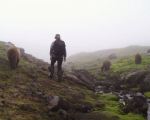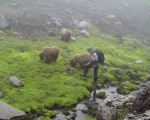From Maureen:
For the first time in 3 days I awakened to a clear view of Kambalnoe Lake. The thick fog that has been blowing in from the west has been depressing, even though it lifted for brief intervals during the day. The cubs passed by the cabin about 6:00AM. Three hours later, heading north of the cabin, I suspected they might be "sacked out" in the mossy basin by the marsh. No cubs. Wandering up Char Creek I was startled to hear the gallop of the feet of the cubs as they joyfully caught up to me. Their tracking skills are clearly far superior to mine!! This is the first time they have actively sought me out when I was out hiking. They are independent now, easily finding all the feed they need. Now that it has reached full bloom, wild parsnip has been added to their menu (Biscuit only eats the flowers) along with the sockeye salmon that are washing up on the shore after spawning in the lake. They no longer need Charlie or me for survival, but choose to be with us for the joy of our company.
I have been working on a definition of "wild bear" for a long time. Riding my horse through Banff National Park in the early nineties, I decided any bear that ran away from me was wild and the grizzlies that were in the proximity of people along the Banff Jasper Highway were habituated. This word was used like a curse with a loose definition."Habituation" seems to mean that the animal is not afraid of humans and thus automatically dangerous. Rubber bullets were consequently fired at the highway bears by park wardens to negatively condition them to being in the presence of people, thus returning the bears to their wild state!!!! The words "tame bear" did not even enter the discussion. But how was I going to define the bears my horse Spud felt comfortable enough to let walk up to him when I was on his back as he rested after a long ride? Was that mother grizzly who let her cubs walk over to Spud and me as she fed on a freshly killed elk calf "habituated"? Or did my horse know something I didn't about grizzly nature that was about trust of others in the animal kingdom?
Five years later, here in the Russian Far East, I have reached some very different conclusions about "wild bears." Bears that run away from people do so largely out of fear. Some fears are automatic, like seeing a strange shape of a person in the fog, causing flight. For the most part, though, bears that are afraid of us here have likely run into a hunter or poacher. I now believe that "running away " is irrelevant to the definition of "wild bear." At the opposite end of the spectrum, I do not believe that bears that like people and are comfortable in their company are necessarily "tame" or domesticated. In 1996, Charlie and I ended the season very frustrated to see so many bears running in terror from the sight or smell of us. Two weeks before heading home, a lovely dark bear came to eat pine cones near our cabin and we filmed and talked to her regularly. She was apprehensive of us at first but after hearing us talk to her she soon gained confidence. I paddled my kayak near her a few days ago. She now has 3 spring cubs. The cubs were uncertain initially, but soon the entire family was at ease with me talking to them 30 feet offshore. She is a bear that lives in what is likely the greatest wilderness left in the world and happens to have decided to trust man. Yet she is still "wild". She must be treated with great care. We have learned that bears are highly intelligent with amazing memories for small details. No bear here has had as much as a mouthful of our food or garbage and we have done all that is possible to insure that the bears in our study area receive only positive messages when they see us.
The wild bear is one that can survive at ease in wilderness. And some lucky wild bears-like our cubs--learn to co-exist in a joyous, safe way with humans, and both man and beast enjoy a richer life from the association.

